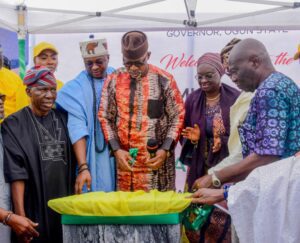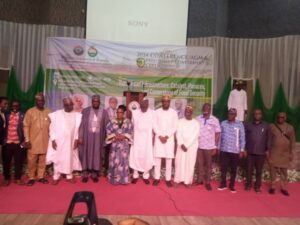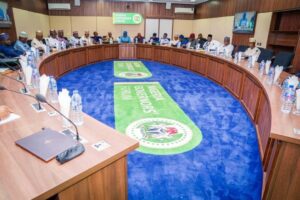
Ameliorating stigma burden among tropical diseases victims February 9, 2023 by Rac
Mr Abubakar Salisu, 44 -year old is from Dobi, a village in Gwagwalada Area Council in the Federal Capital Territory. His experience from tropical disease is piteous.
“It all started when I was a boy in still in school.
“My cousin used to have a tingling sensation. His parents suspected he had contracted leprosy. So they isolated him from the rest of the family and locked him up in one room
“One day I visited them but his parents did not allow me to see him. Being ignorant of his health condition, I gained access to him by jumping through the window.
Unknown to Salisu he contracted leprosy from that encounter with his cousin
“I started having this tingling sensation in two fingers of my right hand. My parents could not explain what was wrong.
“As the symptoms persisted, my parents gave me herbal remedies, but it continued. After some time, I could no longer write so I had to stop going to school.
“When I was eventually diagnosed with leprosy it hit my parents like a ton of bricks. Their initial reaction was that it was sent to me by evil spirits.
“My mother thought I was bewitched because her sister’s son had the same issue,’’ he said.
Salisu said at the age of seven he was rejected by the society; he could no longer play with other kids, was not able to go to school, adding that any time he was hospitalised nurses would speak to him through the window.
“I have lived with the stigma for over 37 years. I have also contemplated suicide.
“Sometimes I become overtly aggressive towards people, but I know I should not. I do it because I suspect they will treat me badly, so I react first’’, he said.
Mr Habibu Baba, a 59-year old leper, said because of stigma and discrimination he was not treated by medical personnel.
He said this resulted in him moving into a lepers’ colony to avoid further humiliation by members of the public.
“Having access to quality care is a big problem we face as lepers.
“We self-medicate most times. During the COVID-19 pandemic we were all told we will die. The government did not consider us in its prevention policy.
“We did not fit into their plans; we are yet to be vaccinated up till today, not even our children get the regular immunisation.
“We are seen as evil; as cursed people, even the health workers that come to look after our children are reluctant to come.
He said that stigma has affected their lives, leading to self-isolation and eroded their confidence.
“Addressing stigma by health workers is crucial to delivering equitable, quality care and achieving optimal health,” he said.
Mrs Mairo Lawal, a retired teacher is lucky. She was among the few who contracted the disease and were successfully treated with no lasting physical damage.
Lawal said she was afraid to share her diagnosis with her colleagues and friends because of the stigma associated with it, with her having previously stigmatised victims.
Public health experts consider stigma as an overriding concern of people with NTDs such as leprosy.
Dr Chukwuma Anyaike, National Coordinator, National Tuberculosis, Leprosy and Buruli Ulcer Control Programme (NTBLCP), said that stigma has a range of concepts including the internal and external.
“People affected by NTDs are frequently the target of social stigma,’’ Anyaike said, adding that not much attention had been paid to mitigating the effect of stigma on victims of NTDs.
“Stigma among health workers also undermines access to diagnosis, treatment, and successful health outcomes.
“When persons affected by leprosy are aware of negative perceptions by health workers, they may be hesitant to seek help,” he said.
Nigeria is battling with 15 neglected tropical diseases out of the 20 identified by the World Health Organisation (WHO).
Some of the diseases are Trachoma (Granular Conjunctivitis), Onchocerciasis (River blindness), Lymphatic Filariasis (Elephantiasis), soil-transmitted helminthiasis (intestinal worms), schistosomiasis (parasitic worms), leprosy, snakebites, Yaws, Rabies, Buruli ulcer, Leishmaniasis, Human African Trypanosomiasis (HAT) among others.
The Minister of Health, Dr Osagie Ehanire, said the country had about 25 per cent of all NTDs in Africa, with millions of persons at risk.
Ehanire said that substantial progress had been made in the past decade, evidenced in the Guinea Worm Disease eradication in 2013 and onchocerciasis transmission elimination in Plateau and Nasarawa States in 2019.
He said there are imminent prospects of Kaduna, Kebbi and Zamfara states being free of the disease soon.
“This leaves us with fewer endemic states and over 28 million persons no longer needing treatment,” he said.
According to him, other achievements by the ministry include epidemiological mapping of preventable NTDs in all the 774 LGAs.
He said that 106 of 126 trachoma endemic LGAs have ended treatment and attaining elimination threshold; with 30 million persons who were at risk of going blind from trachoma being reduced to about 3.5 million.
“The NTDs Programme has managed 70 per cent of 200,000 persons in the backlog for trachoma surgeries,” he said.
Dr Aliyu Suleiman, a WHO officer responsible for NTDs in Nigeria, said in 2022 alone, the country conducted an assessment for lymphatic filariasis, otherwise known as elephantiasis, in 200 LGAs out of 583 endemic LGAs.
“We have less than 300 LGAs needing assessment before stopping mass drug administration for this disease,” he said.
Dr Aminu Magashi Garba, Co-chair of Uniting to Combat NTDs Consultative Forum urgedmore effective monitoring and evaluation of NTDs nationwide and a comprehensive financing mechanism for intervention plans.



